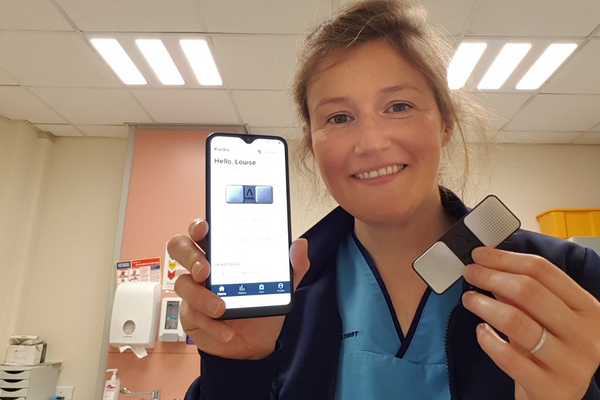Podiatrists embrace technology to help save lives in Western Isles

A recent report has shown how podiatrists in NHS Western Isles have contributed significantly to the early detection of atrial fibrillation
A recent report from Public Health Scotland showed an increase in the number of men dying from heart disease and heart failure in Scotland. In 2021 annual deaths rose above 4,500 for the first time since 2012.
With our healthcare system under immense strain, the need for early detection and intervention has only increased. Podiatrists can detect the early signs of cardiovascular diseases. Their expert training can identify warning signs that the patient may not.
NHS Western Isles is one health board using this often-undervalued skill set. In 2021, Western Isles implemented a new initiative to opportunistically assist in the early detection of atrial fibrillation (AF) when an irregularity in pulse beat is observed during assessment. This condition can often go undetected and if untreated, carries a high risk of stroke and ongoing cardiovascular complications.
The Technology Enabled Care (TEC) and Cardiac Nursing teams partnered with the Podiatry Department. It enabled on-the-spot digital single-lead ECG (Electrocardiogram) testing for patients suspected of an undiagnosed problem with their heart rhythm. The programme aimed to save lives, improve the patient diagnostic experience and make the best use of NHS services.
The Podiatry Team already carried out vascular assessments as part of their routine work. The introduction of the Kardia mobile device allowed the podiatrists to carry out additional checks during the appointment. Since its introduction nearly two years ago, the new screening tool has shown positive results for both patients and healthcare services. Before its introduction, ECG screenings were only available at GP practices or at specialist units.
Since NHS Western Isles podiatrists began using Kardia, over 80% of participants avoided the need for a GP ECG. This has helped significantly reduce the need for travel and additional appointments for many patients by ruling out AF at an earlier stage. The remaining patients have gone on to receive further cardiac investigations with some resulting in diagnoses of AF and heart failure. One particular case of early detection led to an urgent patient transfer by plane to the mainland for surgical assessment.
Louise Campbell, NHS Western Isles podiatrist, said:
“We have been very impressed with the results of this programme. The technology was low-cost and easy to use. Our health board is spread over a very large, rural area meaning our patients may often need to travel long distances to undergo additional testing. Our detection and assessment programme allows us to run the test in the clinic or in their home. The results are then sent electronically to the cardiac nurses for evaluation.”
The Royal College of Podiatry’s Policy and Public Affairs Officer for Scotland, Louise Slorance said:
“The introduction of this project in the NHS Western Isles Podiatry Department has provided life-saving interventions in a local setting. This has reduced the impact on patients by reducing travel time, additional appointments and stress too. It has also saved costs for the NHS and released vital GP time.
“We know the wide-ranging skillset of podiatrists is currently under-used within healthcare services. Podiatrists in both the NHS and the private sector have thousands of patients every day, providing key opportunities to detect a wide range of conditions. We want to see these skills recognised and valued in the development of multi-disciplinary clinical pathways.”
AF commonly displays no symptoms and affects an estimated 2.5% of the population. It is just one of the many conditions that can result in an increased risk of stroke and cardiovascular issues. The estimated cost of providing care for a patient after a stroke is £22,500 for the first year and can have a devastating impact on a person’s life. By incorporating this simple test into their routine vascular assessment, podiatrists can help reduce associated death and disability by contributing to the earlier detection of AF. This is just one of the many conditions that podiatrists are able to detect during appointments and help facilitate early intervention to save lives.
To read more about how podiatrists can help save lives through early detection, download our Podiatric detection of atrial fibrillation or Podiatry-led management of peripheral arterial disease guides now.
